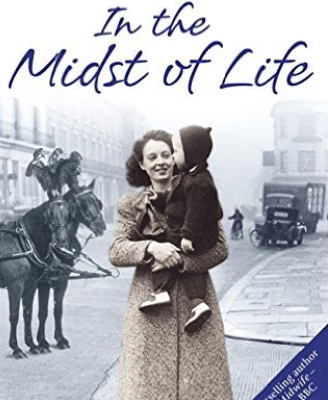This is the last of the four autobiographical works penned by Jennifer Worth. The first, Call the Midwife, was the inspiration behind the very popular BBC series ‘Call the Midwife’, although the series has now moved entirely away from being based on Worth’s books (which is a shame, in my opinion, but that’s by the by).
In the Midst of Life is a moving, even haunting read. After working as a midwife, Worth worked as a nurse and ward sister in London hospitals. This book focuses on the topic of dying and death, with material drawn both from her nursing experience and from the deaths of friends and family in her personal life. This perhaps makes it sound a morbid read, but it is not. The stories are touching and carefully balance the hope and human dignity with the sadness and uncertainty that can all be present in dying.
It is a very reflective and carefully researched book, which highlights changes in the ways we perceive death and the ways we die, since medicine and hospital care have so rapidly advanced in the last half century. Worth argues convincingly that the dignity and peace that used to be possible have largely been ripped away from us, as ambulance teams and hospitals feel compelled (largely from fears of being sued or accused of malpractice) to attempt to resuscitate and prolong the lives of terminally ill and very elderly patients, despite the loss of quality of life and dignity and good health that often ensues: she questions whether this is the right approach. The book leaves most questions open, compelling the reader to reflect and form their own judgements on difficult questions such as: prolonging life despite loss of quality of life; euthanasia; hospitalisation of dying patients; care for the elderly.
There are some arguments, however, that Worth does gently postulate through the narrative strands of the book, and then discusses a little more in her conclusion. The first is that death is something we should not shy away from discussing; in fact, she maintains, it is something we need to discuss. On the second main argument, I shall quote from her conclusion, since she puts it so clearly and concisely:
Life used to be so much simpler, as it still is in many parts of the world. Birth, life and death were seen as part of a great whole, ordained by God. This has largely been eroded by the steady decline in faith. But it seems that Man is a believing animal; we absolutely must believe in something outside ourselves, and preferably something beyond our understanding. Having lost faith in God, we place it uncritically elsewhere. Huge numbers of people now cling to faith in science, which, it is thought, can be controlled.
This is the root cause of all our problems. The dilemma has not come upon us through science or medicine, per se, nor even from social attitudes to death. It has crept up on us through lack of faith, and hidden between the lines of this book is a plea for a return to the simple understanding that life and death are in God’s hands, not ours.
Despite the overtly Christian conclusion, the rest of the book is not – I think – Christian to a point that would be off-putting to a non-Christian. In fact, I wasn’t actually sure if Worth was a Christian or an agnostic until almost the end of the book. As a Christian, the book deeply touched me, but I think it is as accessible and engaging to a non-Christian. What I mean to say, I suppose, is it is not what I would categorise, in terms of genre, as a Christian book, but rather an autobiographical reflection upon death in contemporary society. I have read reviews of overtly Christian books which find them ‘pushy’; I don’t think the same could be said here. In fact, I was quite surprised by Worth’s ambivalent stance on euthanasia, which is not what I would have expected from a Christian, but I understand her reasoning – which she explains, even though I disagree with her viewpoint.
The book is particularly poignant as the reader discovers at the end that Worth herself has recently been diagnosed with advanced cancer of the esophagus and is in the early stages of palliative care. Her perspective on her approaching death is inspiring as it is calm, measured, and peaceful.
The book is made up of episodes of different autobiographical stories (though Worth always places other people, rather than herself, under the spotlight, and sensitively brings the characters’ thoughts and feelings to life). As such, it is the kind of book where you can easily pick it up and read a couple of chapters, and then put it down and come back to it several days later, without feeling like you’ve lost the thread. I read it as a kindle book on my phone, reading a chapter or two each night before I fell asleep, which worked well for this, unlike cliff-hanger-style narratives!
Overall, a moving and interesting read that I would definitely recommend.


I will have to add this to my TBR! I love Call The Midwife (show not book, surprisingly)
LikeLiked by 1 person
Thanks for your comment 🙂 Looking forward to reading what you think of ‘In the Midst of Life’ when you’ve read it!
LikeLiked by 1 person